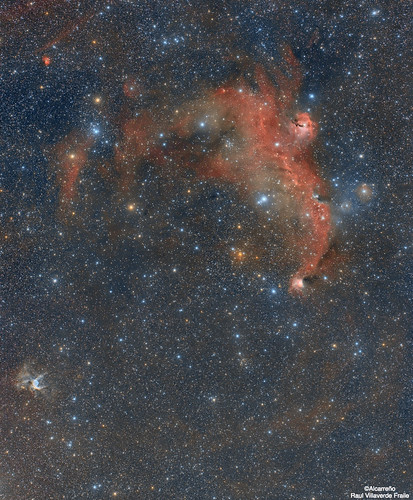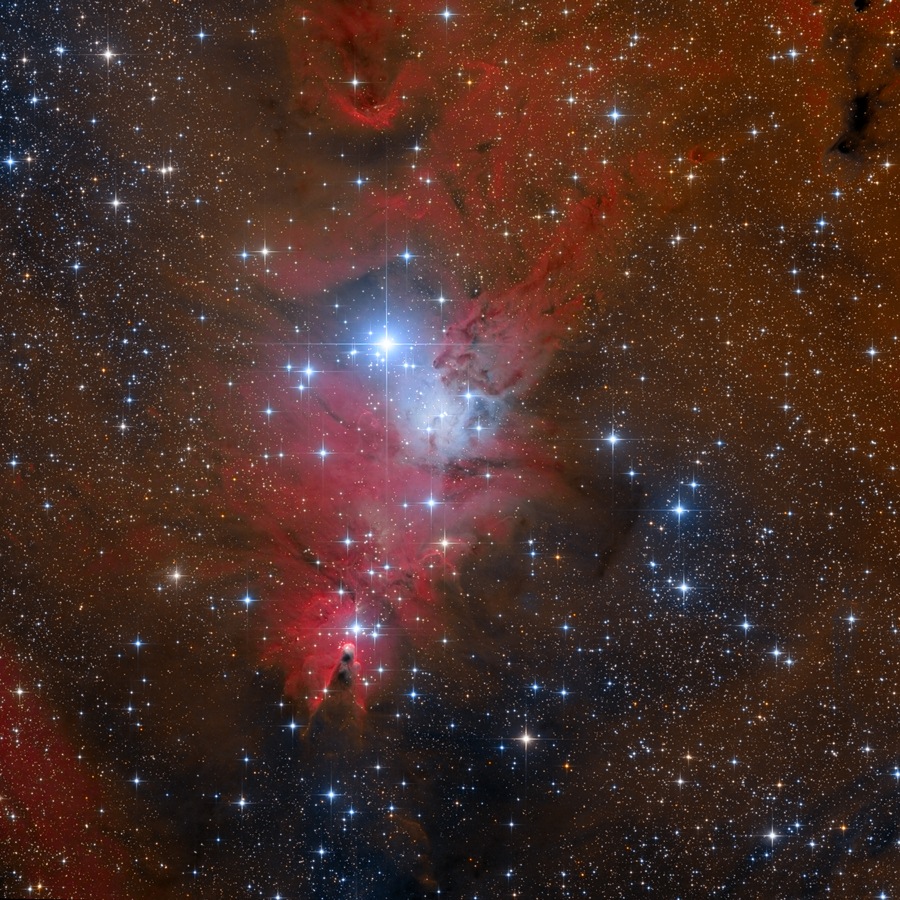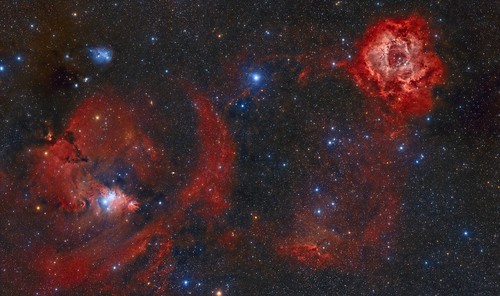Page 3 of 5
Re: Submissions: 2018 February
Posted: Thu Feb 08, 2018 4:49 pm
by Star_Digger

- Rosette
https://www.flickr.com/photos/132752244@N07/39439296964/in/dateposted-public/
Re: Submissions: 2018 February
Posted: Thu Feb 08, 2018 6:50 pm
by paddygilliland
Re: Submissions: 2018 February
Posted: Thu Feb 08, 2018 8:26 pm
by Thirteen
M106 - A Nearby Seyfert Galaxy
A look at a beauty of a spiral with a very active core. Enjoy!
Image copyright: Jason Guenzel
Description:
http://astrob.in/full/331791/0/
Full size:
http://astrob.in/full/331791/0/

Re: Submissions: 2018 February
Posted: Fri Feb 09, 2018 5:48 pm
by kiko.fair
Touching Eta Carinae
Story: Several days in a row photographing the night sky at the Atacama´s Desert. Great experience! In the moment I shot this picture I was alone, in the middle of nowhere, experimenting a scene that clearly looked like another world. The 33 feet sculpture 'Hand of the Desert ' helped to create an even more alien atmosphere. It was a unique photoshoot indeed.
It was already pass 4:00 AM and a certain tiredness knoked my door. I started packing since I still would had two hours drive ahead. Just before leaving, I looked back and saw this wonderful scene forming: the hand almost "touching" Eta Carinae nebulae and the Southern Cross constellation! What a view!
I pulled everything out and began the photographic process again, hoping to capture a unique view of our southern night skies, harmonizing with a gigantic sculpture. (Mario Irarrázabal is the sculptor)
Copyright: Carlos ´Kiko´ Fairbairn
Gallery: https://www.facebook.com/kikofairbairn
Instagram: @kikofairbairn
Ic 2177 and NGC 2359
Posted: Fri Feb 09, 2018 6:19 pm
by alcarreño
Copyrights: Raul Villaverde Fraile
 IC2177_MOSAICO_2018v2
IC2177_MOSAICO_2018v2 by
Raul Villaverde, en Flickr
Re: Submissions: 2018 February
Posted: Fri Feb 09, 2018 8:43 pm
by Steve Pastor
The edge-on galaxy NGC 891 in Andromeda
The edge-on galaxy NGC 891 is found in the constellation Andromeda. NGC 891 is approximately 30 million light-years away and is similar in size to our own Milky Way galaxy. A prominent dust lane is seen in the plane of the galaxy with tendrils of dust seen above and below that plain. These dust tendrils may be due in part to supernova explosions. The image is a total of 11 hours of exposure through a 12.5 inch f/9 RCOS astrograph with a SBIG STF8300c CCD camera on a Paramount ME taken in Mayhill, NM on the nights of 13, 14 Oct 2016; 16 Nov 2017; 13, 15 Dec 2017, and 13, 19 Jan 2018 (33 X 1200 sec lights @ -15 degrees C; 18 darks, 128 bias; 128 flats). Processed in PixInsight 1.8.5.1353 Ripley (X64).
Larger image:
http://astronomersgroup.org/gallery/dis ... fullsize=1
Re: Submissions: 2018 February
Posted: Fri Feb 09, 2018 9:56 pm
by mrtvrt
Light pollution and Orion Constellation
Different colours light pollution and Orion Constellation in Estonia
Copyright: Märt Varatu
Re: Submissions: 2018 February
Posted: Fri Feb 09, 2018 11:01 pm
by Rothkko
smartphone photos (edited)
sun halo
iridiscence
rainbow

- merida, spain. 2017-11-20, 2018-01-08 and 2018-02-09
Re: Submissions: 2018 February
Posted: Sun Feb 11, 2018 4:20 am
by SteveJ
Southern Summer Sky from Bruny Island
Copyright: Steve Johnston
Image taken from Dennes Point, Bruny Island, Tasmania, Australia on 5 January 2018, looking north across D'Entrecasteaux Channel.
Foreground cliff is Triassic sandstone, 205-251 million years old, which is relatively young compared with the age of the majority of the stars in the image. Canon 5D MkII, 14mm @ f/2.8, ISO-3200, single exposure 19s.
Re: Submissions: 2018 February
Posted: Sun Feb 11, 2018 3:24 pm
by Rothkko
storks
iridiscence

- merida, spain. 2018-02-11
equiv. 288mm, polarized filter
Re: Submissions: 2018 February
Posted: Sun Feb 11, 2018 4:38 pm
by Maicon Germiniani
Re: Submissions: 2018 February
Posted: Sun Feb 11, 2018 11:00 pm
by DangAstro
Kepler, Copernicus and the ISS
https://www.astrobin.com/full/333216/C/?nc=user
Copyright: Daniel Goelling
Re: Submissions: 2018 February
Posted: Mon Feb 12, 2018 12:36 am
by KuriousGeorge
Whirlpool Galaxy in Narrowband.
Was always curious what M51 might look like in narrowband. Here I mapped Ha to Red, OIII to Blue and SII to Green with a luminance overlay for detail.
Imaging telescope or lens: Celestron 8" EdgeHD
Imaging camera: QSI 660 WSG
Mount: Losmandy G-11
Guiding camera: Starlight Xpress Ultrastar
Focal reducer: Celestron 0.7X
Software: Maxim DL6, PixInsight 1.8, PHD Guiding 2, Neat Image V7, Photoshop CS3, Sequence Generator Pro
Filters: Astrodon 1.25" 3nm SII, Astrodon 1.25" 3nm OIII, Astrodon 1.25" 5nm Ha, Astrodon 1.25" L
Accessories: Innovations Foresight ONAG SC, Optec FocusLock, Peterson Engineering EZ Focus Kit
Resolution: 2528x1932
Dates: Feb. 7, 2018, Feb. 8, 2018, Feb. 9, 2018
Frames:
Astrodon 1.25" 3nm OIII: 9x900" -15C bin 1x1
Astrodon 1.25" 3nm SII: 10x900" -15C bin 1x1
Astrodon 1.25" 5nm Ha: 10x900" -15C bin 1x1
Astrodon 1.25" L: 59x600" -15C bin 1x1
Integration: 17.1 hours
Darks: ~40
Flats: ~80
Flat darks: ~80
Bias: ~20
Avg. Moon age: 22.89 days
Avg. Moon phase: 42.22%
Mean SQM: 19.50
Astrometry.net job: 1925166
RA center: 202.471 degrees
DEC center: 47.196 degrees
Pixel scale: 0.637 arcsec/pixel
Orientation: 94.433 degrees
Field radius: 0.282 degrees
Locations: Home, Rancho Santa Fe, California, United States
Re: Submissions: 2018 February
Posted: Mon Feb 12, 2018 8:39 am
by paddygilliland
Re: Submissions: 2018 February
Posted: Mon Feb 12, 2018 8:41 am
by B_Delsaert
NGC2264
Copyright Bart Delsaert
 Link to high res image
Link to high res image
Re: Submissions: 2018 February
Posted: Mon Feb 12, 2018 9:33 pm
by Rothkko
iss over merida, between orion, his large dog and the hare. equiv 27.2mm, tv 116" av 8.0 iso 100
orion, his large dog, the hare...

- merida, spain. 2018-02-12, 20:14 and 20:24
Re: Submissions: 2018 February
Posted: Tue Feb 13, 2018 9:40 am
by hbastro
Super Moon Lunar Eclipse and Star Field
Re: Submissions: 2018 February
Posted: Tue Feb 13, 2018 3:26 pm
by Rothkko
three suns, equiv. 288mm, polarized filter

- merida, spain. 2018-02-11, 12:55, 13:10 and 13:16
Re: Submissions: 2018 February
Posted: Tue Feb 13, 2018 6:40 pm
by AlbertoP
Barnard's Loop 3x3 Mosaic LRGB
Telescope: Rokinon 135mm
Camera: QSI 583
Mount: Astro Physics AP Mach 1 GTO with GTOCP3
Astrodon Tru-Balance E-Series Generation 2: 108x300" per channel LRGB
Full Resolution:
https://www.astrobin.com/full/333144/0/
http://i64.tinypic.com/2vwik5f.jpg
Copyright: Alberto Pisabarro
Re: Submissions: 2018 February
Posted: Wed Feb 14, 2018 2:07 pm
by canopia
2 Novae in deep southern sky
Copyright: Tunç Tezel
[br]
In mid-January, the news of a nova in Musca arrived. According to the initial observations, this was a 7th magnitude object, bright enough to be spotted by binoculars. After peaking at around mag. 6.7, it started to fade slowly.
https://www.aavso.org/aavso-alert-notice-609
In 25th January, there was news of another possible nova in Circinus. This nova was reported to be a 9th magnitude object at discovery, but it gradually brightened to 7th magnitude in the following days.
https://www.aavso.org/aavso-alert-notice-613
This is the view of the deep southern constellations and Milky Way including the both novae, as seen from the rim of Kilauea Caldera, Hawaii. At the time of photography (31st January, 1410 UT, during the total Lunar eclipse), Nova Mus 2018 was at mag. 8.0, while Nova Cir 2018 was at mag. 7.5. Meaning, the annotated version has to include detailed insets for both novae, which could otherwise be lost amongst many other similar looking stars in the deep southern Milky Way.
Re: Submissions: 2018 February
Posted: Wed Feb 14, 2018 7:49 pm
by marctoso
WaterGlyph
http://www.ancientskys.com
Copyright: Marc Toso
This past weekend I visited this petroglyph, known as a waterglyph, along the Utah/Arizona border. Some theories says these were navigational markers The circle represents the horizon, the line the direction of site and the small circle within the circle is a water source or village. These petroglyphs are estimated to be at least 1,000 years old
http://www.waterglyphs.org
Also, some said the Hopi used them in "Look up, Ceremonies". Waterglyphs were "Sacred Viewing stations" (
http://dixierockart.webs.com/Technical% ... Glyphs.pdf)
The nigh was frigid and the landscape was desolate. I didn't see another living soul the entire time. However, it seemed as if at one time this was an important place, a place where things occurred.
The petroglyph points straight east to where the sun would rise and for me the rising moon, as seen sitting in the core of the milky way.
Places like this need to be kept as the are, far from city lights, and the noise of roads. We need places like this that allow us to have one foot in this world and one foot in the other.
This is my first photo in this style of this year. Hopefully more will follow. However, It's a challenge to do many in this theme.
Driving, finding the sites... Then trying to photograph the site in a way that I can be sure not to damage it. This usually involves predicting composition in the daylight, setting up the camera and leaving everything in place until the appropriate time.
Sometimes I'll program the camera to take photographs at a specific time, especially if I don't feel comfortable or if it seem disrespectful to be bumbling around at night. Other times I'll return at a certain hour and take the photo.
Usually these photos consume an entire weekend and I usually come away with a single image, sometimes two.
Re: Submissions: 2018 February
Posted: Thu Feb 15, 2018 11:08 pm
by Rothkko
sun, iridiscence clouds...
and sunspots

- mérida, spain. 2018-02-11, 12:39
equiv. 288mm, polarized filter
Re: Submissions: 2018 February
Posted: Fri Feb 16, 2018 4:15 am
by Ajay Narayanan
Messier 65
I downloaded the publicly available data from the LCOGT network and processed this image.
Data for this image was collected by a 1m telescope (1m-08) operated by the Las Cumbres Observatory telescope network at he McDonald Observatory. The Principal Investigator for this data set was BJ Fulton. Thanks for looking!
https://c1.staticflickr.com/5/4724/3846 ... e928_c.jpg
Full image at:
https://www.flickr.com/photos/ajynrynn/ ... ed-public/
Chamaeleon Molecular Cloud
Posted: Sat Feb 17, 2018 9:53 am
by strongmanmike
This field of very faint dusty molecular material is a challenge to image and forms part of the much larger Chamaeleon Molecular Cloud. This dusty material fills the constellation of Chameleon and beyond, in the far southern sky, not far from the South Celestial Pole.
Larger image here:
http://www.pbase.com/strongmanmike2002/ ... 6/original
Copyright: Michael Sidonio
Re: Submissions: 2018 February
Posted: Sat Feb 17, 2018 10:10 am
by alcarreño
Copyrights: Raul Villaverde Fraile & José Jiménez
 Monoceros RGB+Halfa+datos de metV2
Monoceros RGB+Halfa+datos de metV2 by
Raul Villaverde, en Flickr

 Monoceros RGB+Halfa+datos de metV2 by Raul Villaverde, en Flickr
Monoceros RGB+Halfa+datos de metV2 by Raul Villaverde, en Flickr